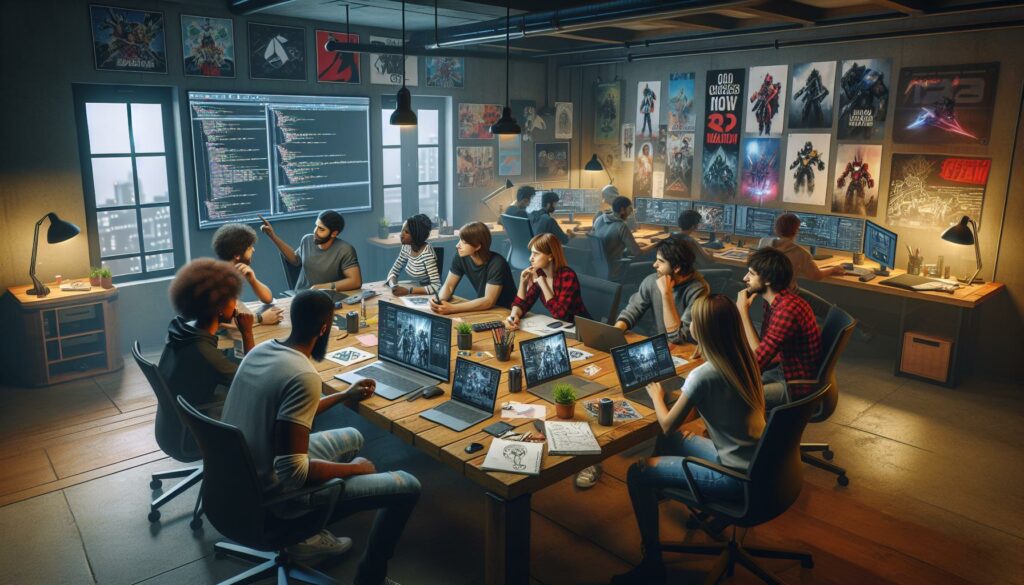I’ve spent over a decade in video game development and can tell you it’s one of the most rewarding career paths in tech. From indie gems to AAA blockbusters the gaming industry continues to grow exponentially offering countless opportunities for creative minds. Breaking into game development might seem daunting at first but I’ll show you it’s more accessible than ever. Whether you’re passionate about programming crafting immersive stories or designing captivating artwork there’s a place for you in this dynamic field. The key is knowing where to start and which path aligns with your specific interests and skills.
- The gaming industry offers diverse career paths including game designers, programmers, artists, animators, and producers, with each role requiring specific technical skills and core competencies.
- Essential technical foundations include mastering programming languages (C++, C#, Python) and industry-standard tools like Unity, Unreal Engine, and various asset creation software.
- Both formal education (game development degrees) and self-learning paths can lead to success, with formal education costing $30,000-$70,000 annually while self-learning through online courses costs $15-50 monthly.
- Building a strong portfolio with documented projects, playable demos, and development artifacts is crucial for breaking into the industry, along with gaining experience through internships and networking at gaming events.
- Independent game development requires business planning, legal considerations, and understanding of digital distribution platforms, with different platforms offering various revenue splits (Steam 70/30, Epic 88/12).
How to Get Into Video Game Development
The video game industry operates through interconnected roles spanning development studios, publishing houses, and independent creators. I’ve witnessed the industry transform from a niche market into a $200+ billion global powerhouse.
Different Career Paths in Gaming
The gaming industry offers diverse career paths aligned with specific skill sets and interests:
- Game Designer: Creates gameplay mechanics, level designs, and player experiences
- Programmer: Develops game engines, writes code for gameplay features, and implements core systems
- 3D Artist: Crafts character models, environments, and visual assets
- Animator: Brings characters and objects to life through movement and motion
- Sound Designer: Creates audio effects, music, and ambient soundscapes
- Producer: Manages development teams, schedules, and project timelines
- QA Tester: Identifies bugs, ensures gameplay balance, and validates features
- Technical Artist: Bridges the gap between artists and programmers
- Narrative Designer: Develops storylines, dialogues, and character arcs
- UI/UX Designer: Creates intuitive game interfaces and menu systems
Required Skills and Qualifications
Each gaming career path demands specific technical skills and core competencies:
| Role | Technical Skills | Core Competencies |
|---|---|---|
| Game Designer | Prototyping Tools, Scripting | Problem-solving, Creative Design |
| Programmer | C++, Unity/Unreal Engine | Algorithms, Software Architecture |
| 3D Artist | Maya, ZBrush, Blender | Visual Design, Technical Art |
| Producer | Project Management Software | Leadership, Communication |
| QA Tester | Testing Methodologies, Bug Tracking | Attention to Detail, Analysis |
- Portfolio of completed projects or game mods
- Proficiency in industry-standard development tools
- Understanding of game design principles
- Knowledge of agile development practices
- Ability to work in collaborative team environments
- Familiarity with version control systems like Git
- Strong problem-solving capabilities
- Experience with game engines (Unity, Unreal)
Building Your Technical Foundation
Building a strong technical foundation involves mastering essential programming languages and industry-standard game development tools. Through my 10+ years in game development, I’ve identified the most crucial technical skills for aspiring developers.
Choosing Programming Languages
C++ dominates game engine development, powering engines like Unreal Engine and Unity’s core systems. Here are the primary languages for game development:
- Master C++ for high-performance game systems, physics engines and memory management
- Learn C# for Unity development and rapid prototyping
- Use Python for game tooling, automation and artificial intelligence systems
- Apply Java for Android game development and cross-platform projects
- Implement Lua for game scripting and modding support
Programming Language Usage in Game Development:
| Language | Primary Use Cases | Adoption Rate |
|---|---|---|
| C++ | Engine Development | 73% |
| C# | Game Logic | 65% |
| Python | Tools & AI | 41% |
| Java | Mobile Games | 38% |
| Lua | Scripting | 29% |
Learning Game Development Tools
Modern game creation relies on specialized development environments and frameworks. Essential tools include:
- Set up Unity for 2D and 3D cross-platform development
- Configure Unreal Engine for high-fidelity graphics and advanced features
- Install Visual Studio for code editing and debugging
- Use Git for version control and collaborative development
- Master Maya or Blender for 3D asset creation
- Implement Photoshop or GIMP for texture and UI design
- Deploy Perforce for large-scale project management
| Engine | Best For | Market Share |
|---|---|---|
| Unity | Mobile & Indies | 48% |
| Unreal | AAA & Graphics | 31% |
| Godot | Open Source | 11% |
| Custom | Specialized Games | 10% |
Getting the Right Education
Educational pathways in game development combine traditional academic programs with practical skill development through hands-on projects. My experience shows that both formal education and self-directed learning create viable paths to success in the gaming industry.
Degree Programs vs Self-Learning
A formal game development degree provides structured learning with comprehensive curriculum coverage and networking opportunities. Bachelor’s degrees in Computer Science Game Development cost $30,000-$70,000 per year while self-learning through online courses costs $15-50 per month. Here’s how each path compares:
Degree Programs:
- Access to professional-grade equipment and facilities
- Direct mentorship from experienced faculty
- Structured internship programs with industry partners
- Built-in networking through alumni connections
- Recognized credentials for traditional hiring pipelines
Self-Learning:
- Flexible learning schedule and pace
- Lower financial investment
- Immediate application of skills through personal projects
- Focus on specific areas of interest
- Regular updates with current industry trends
Top Game Development Schools
Leading institutions offer specialized programs combining technical expertise with creative development. These schools maintain strong industry connections and placement rates:
| School | Notable Program | Annual Tuition (2023) | Job Placement Rate |
|---|---|---|---|
| DigiPen Institute | BS in Computer Science and Game Design | $42,000 | 89% |
| Full Sail University | BS in Game Development | $38,000 | 83% |
| USC Games | BS in Computer Science (Games) | $60,446 | 92% |
| Rochester Institute of Technology | BS in Game Design and Development | $45,000 | 86% |
- Industry-standard software and hardware labs
- Regular guest lectures from gaming professionals
- Portfolio development throughout the curriculum
- Game studio partnerships for internships
- Annual game showcases for student projects
Creating Your First Games
Game development mastery begins with hands-on experience creating actual games. Starting small and gradually increasing complexity builds essential skills alongside practical knowledge.
Starting With Simple Projects
My experience shows that classic arcade games offer ideal starting points for new developers. Here’s a progression path of beginner-friendly projects:
- Text-based adventures using basic input/output commands
- 2D platformers with limited mechanics (jumping movement collision)
- Simple puzzle games like Match-3 or Tetris clones
- Top-down shooters with basic enemy AI
- Side-scrolling games with parallax backgrounds
Each project introduces fundamental concepts:
- Basic game loops
- Player input handling
- Collision detection
- Resource management
- Simple AI behaviors
Building a Portfolio
A game development portfolio demonstrates technical abilities through completed projects. Here’s what to include:
- Documented source code
- GitHub repositories with clean commits
- Commented code explaining key functions
- README files detailing setup instructions
- Playable demos
- Web-based versions for easy access
- Downloadable builds for multiple platforms
- Video captures of gameplay features
- Development artifacts
- Design documents
- Asset creation process
- Technical implementation details
- Bug tracking history
- Performance optimization records
Create separate portfolio sections for:
- Programming samples
- Game design documents
- Visual assets
- Sound design elements
- UI/UX mockups
- Technical specifications
- Development timeline
- Role description
- Problem-solving examples
- Performance metrics
Breaking Into the Industry
Breaking into the video game industry requires strategic positioning through real-world experience and professional connections. Here’s how to establish a foothold in this competitive field.
Internship Opportunities
Game development internships provide hands-on experience in professional studio environments. Major studios like Ubisoft, EA, Blizzard offer 3-6 month paid internship programs in roles including programming, art design, quality assurance. I’ve observed that successful internship applications include:
- Create targeted portfolios with 2-3 relevant projects for each application
- Apply during peak recruitment seasons: September-October for summer positions
- Connect with studio recruiters on LinkedIn 4-6 weeks before applications open
- Focus on mid-sized studios which offer 15-20% higher conversion rates to full-time positions
- Participate in game jams to gain collaborative experience beforehand
Networking at Gaming Events
Industry events create direct pathways to connect with game developers and studios. Key networking opportunities include:
- Attend game developer conferences (GDC, PAX, E3) to meet industry professionals
- Join online communities: Discord servers, Reddit r/gamedev, GameDev.net
- Participate in local game development meetups through platforms like Meetup.com
- Connect with 3-5 new industry contacts at each event
- Follow up within 48 hours after making connections
| Event Name | Annual Attendees | Industry Professionals | Networking Sessions |
|---|---|---|---|
| GDC | 29,000 | 18,000 | 35+ |
| PAX East | 40,000 | 8,000 | 20+ |
| E3 | 66,000 | 15,000 | 25+ |
| Gamescom | 370,000 | 31,000 | 40+ |
Working as an Independent Developer
Independent game development offers creative freedom and direct control over project decisions. I’ve seen countless solo developers transform innovative ideas into successful games through strategic planning and efficient resource management.
Starting Your Own Studio
Starting an independent game studio requires careful consideration of legal structure sales projections. I recommend registering as an LLC for tax benefits liability protection. Essential startup components include:
- Business plan with 12-month financial projections revenue goals
- Legal documentation (business registration tax ID numbers)
- Development tools (engine licenses asset creation software)
- Marketing budget for promotional activities social media
- Project management tools (Trello Jira Asana)
Key partnerships to establish:
- Legal counsel for contracts IP protection
- Accountant for financial management tax planning
- Digital storefront representatives Steam Epic GOG
- Marketing specialists community managers
- Technical contractors for specialized development needs
Publishing Your Games
Digital distribution platforms provide direct access to global gaming markets. Here’s a breakdown of major platforms and their requirements:
| Platform | Revenue Split | Setup Fee | Review Time |
|---|---|---|---|
| Steam | 70/30 | $100 | 1-5 days |
| Epic Store | 88/12 | $0 | 2-4 weeks |
| GOG | 70/30 | $0 | 1-2 weeks |
| Itch.io | 90/10 | $0 | Immediate |
Essential publishing steps:
- Create compelling store pages screenshots trailers
- Implement platform-specific features achievements leaderboards
- Set up analytics tracking tools sales monitoring
- Establish customer support channels documentation
- Design marketing campaigns release schedules
- Configure regional pricing localization options
- Release early access versions for community feedback
- Utilize wishlist marketing build anticipation
- Schedule strategic discount promotions bundles
- Partner with content creators streamers
- Leverage platform-specific promotional opportunities
Starting a career in video game development is an exciting journey that’s more accessible than ever before. After spending over a decade in this industry I can confidently say that success comes from combining technical skills with genuine passion and dedication.
Whether you choose formal education pursue self-learning or dive into independent development the key is to start creating games and building your portfolio. The gaming industry continues to evolve offering countless opportunities for creative minds to make their mark.
I’ve seen firsthand how both small indie developers and large studio teams can create amazing experiences that captivate millions. Your path into game development begins with that first step – so grab your tools start learning and begin building your future in this dynamic industry.


